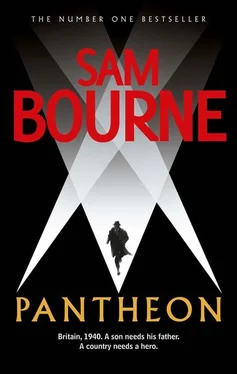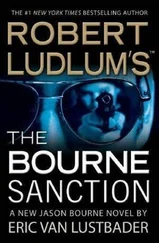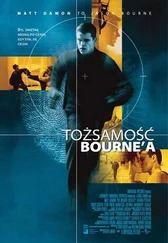Sam Bourne - Pantheon
Здесь есть возможность читать онлайн «Sam Bourne - Pantheon» — ознакомительный отрывок электронной книги совершенно бесплатно, а после прочтения отрывка купить полную версию. В некоторых случаях можно слушать аудио, скачать через торрент в формате fb2 и присутствует краткое содержание. Жанр: Триллер, на английском языке. Описание произведения, (предисловие) а так же отзывы посетителей доступны на портале библиотеки ЛибКат.
- Название:Pantheon
- Автор:
- Жанр:
- Год:неизвестен
- ISBN:нет данных
- Рейтинг книги:3 / 5. Голосов: 1
-
Избранное:Добавить в избранное
- Отзывы:
-
Ваша оценка:
- 60
- 1
- 2
- 3
- 4
- 5
Pantheon: краткое содержание, описание и аннотация
Предлагаем к чтению аннотацию, описание, краткое содержание или предисловие (зависит от того, что написал сам автор книги «Pantheon»). Если вы не нашли необходимую информацию о книге — напишите в комментариях, мы постараемся отыскать её.
Pantheon — читать онлайн ознакомительный отрывок
Ниже представлен текст книги, разбитый по страницам. Система сохранения места последней прочитанной страницы, позволяет с удобством читать онлайн бесплатно книгу «Pantheon», без необходимости каждый раз заново искать на чём Вы остановились. Поставьте закладку, и сможете в любой момент перейти на страницу, на которой закончили чтение.
Интервал:
Закладка:
James felt a tremor of anticipation run through him. ‘Where?’
‘Willard Hotel. Right by the White House. Sending a message to FDR, nice and direct.’
‘Can we go there now?’
‘I’m ahead of you, Dr Zee.’ As he spoke, Harrison gestured for them to turn right down Constitution Avenue, as wide and grand as a boulevard in Paris. James shot a glance over his shoulder, to check that no one was following. Soon, if not by now, McAndrew would learn that the killer he had hired had failed to complete his mission — and he would surely send another in his place.
‘The meeting’s closed to the public, of course,’ said Ed.
‘Damn.’
‘Worry not, Jimbo. When I say closed to the public, I mean closed to the public. Not the press.’
‘So you’ll be allowed in?’
‘As will you.’ And, with a flourish, Harrison reached into his bag, a deep satchel slung over his shoulder that James remembered from Spain, and produced a camera. Bigger than an encyclopaedia and twice as heavy, with a flashbulb post doubling as a grip for the right hand, it was the object James had seen in a hundred newsreels, but never up close. ‘Congratulations, Jim Zennor, newest addition to Time ’s legendary team of photographers.’
They passed a series of imposing, governmental buildings rendered with imperial grandeur in grey-white stone. This must have been how London looked a century ago, James thought: a capital city with the power to rule the world. How that had changed, the great British Empire now reduced to praying that the young Americans would ride to their rescue. Without their help, his country was doomed. All that muscle, but so useless if America refused to flex it.
He was just beginning to feel the heat — a damp, humid, almost tropical heat — when Ed signalled that they had arrived. The hotel was tall and wedge-shaped; it too would not have looked out of place on a European street corner. Through the windows on one side, he could see waiters in white aprons fussing over guests, lifting chrome plate covers to reveal steaming hot breakfasts. Even from the pavement, James could see a custard-yellow cloud of scrambled eggs placed before a moustached man, distractedly reading his morning newspaper. Even in his agitated state, James worked out that there must have been three weeks’ egg ration on that plate.
They walked into the lobby, as tall as a cathedral and as opulent as a palace, the floor shiny, the pillars dizzyingly high in amber marble, the ceiling decorated in gold. It could have been Versailles. ‘Remember,’ muttered Harrison through gritted ventriloquist’s teeth, ‘you’re the snapper. Hang back.’
James dipped his head to hide his face and whispered back, ‘But you don’t know what McAndrew looks like.’
‘Sure I do. Joy of working for a news magazine, Jimbo: we have a photo archive. I checked.’
While Harrison strode over to the reception desk, James loitered in the lobby, his eyes scoping the room for a familiar face. No sign of the Dean. No sign of any groups at all, in fact; just individual businessmen coming down for breakfast. It was not yet eight o’clock. Once again James tormented himself with the probability that he had got here too late. McAndrew had had a head start of several hours; he had probably had his meeting last night…
James could hear Ed Harrison demanding to speak to the manager, wanting to see the full list of associations holding meetings in the Willard Hotel. Just from the tone of the exchange, James could tell the reporter was being rebuffed. Perhaps McAndrew had left specific instructions to keep out the press. James strolled, as nonchalantly as he could, to the concierge desk. As he did, he called up before his mind’s eye page sixteen of that morning’s Washington Post. In that image, he found what he was looking for.
‘Excuse me,’ he said to a young man standing by a lectern-high desk, wearing a bell captain’s uniform at least two sizes too big for him. ‘I’m here for a meeting booked in the name of P Alexander Tudor. Could you tell me where I need to go?’
‘Oh, that would be a question for reception, I’m afraid, sir.’
‘I know,’ James said with a smile. ‘But they seem a little tied up.’ The sound of raised voices, Harrison’s the loudest, reached their side of the lobby.
They exchanged a brief smile of shared understanding. ‘Of course, sir,’ said the concierge, reaching for a pile of papers. After he had run his finger down one and then another column, he looked up. ‘You need the Buchanan Room, sir. On our lower level.’
James nodded his thanks and hissed in Harrison’s direction, eventually succeeding in breaking him away from his altercation with the front desk. He led the way down the carpeted stairs, following the signs until they came to two closed wooden doors bearing the name Buchanan.
James paused, not sure whether they were about to barge into a room where a dozen people would be having a quiet — and private — discussion around a single table or where four hundred people would be arrayed like a theatre audience, listening to speeches from a platform. Against the first possibility, and the chance that he would see and be seen by McAndrew instantly, he held tightly onto the camera, ready to lift it to his face.
Harrison pushed at the door confidently, notebook in hand. Everything about his demeanour, down to the tilt of his hat, announced him as a newspaperman. What a weapon it was, James reflected now: both a licence to pry and a protective shield.
The instant the door was open, James recognized the scene. They had walked into an event that had not yet started, clusters of men standing together engaged in pre-meeting conversation. There were perhaps forty of them, hovering and shaking hands; behind them, a long boardroom table laden with untouched notepads and pin-sharp pencils. A portrait of George Washington in a cheap wooden frame appeared to have been hastily attached to the wall.
James raised his camera and began to look through the viewfinder, hoping no one would realize what he had just realized: that although he had once been quite a keen photographer — an interest discarded, like so much else, after his injury — he had no idea how to use this machine. He let his finger feel for a shutter while surveying through the room. To his right he could sense Harrison advancing, plunging into the middle of the room as if he were the guest of honour apologizing for his late arrival.
In the small glass window, James saw a series of faces, none familiar. That they were well-heeled, he could guess — from the silvery smoothness of their hair, from the effortless cut of their suits. But no sign of the salt-and-pepper of the Dean. He let the lens glide slowly across the room. More captains of industry, a dishevelled overweight figure James took to be another pressman.
And then the camera froze in his hands.
It was the dog collar he saw first, only later raising the lens to confirm the man wearing it: the Reverend Theodore Lowell, pacifist, chaplain of Yale University and alumnus of Wolf’s Head. Quite a crowd from Yale then, gathering here in this Washington hotel just yards away from the White House to stop the march to war. Perhaps he and McAndrew had travelled here together; maybe Tudor had acted as their chauffeur, driving his two most distinguished allies down here. James concentrated his lens on Lowell’s lapel and then focused on the same area of the man to whom the chaplain was speaking.
Both wore the same Wolf’s Head pin.
He could hear Harrison’s voice above the others now, buttering up the politicians and plutocrats in the room, no doubt the first step to extracting information — not that different, James supposed, to the way the reporter approached girls.
And suddenly he was struck by a crucial realization. Though James knew what Lowell looked like, Lowell had no idea who James was.
Читать дальшеИнтервал:
Закладка:
Похожие книги на «Pantheon»
Представляем Вашему вниманию похожие книги на «Pantheon» списком для выбора. Мы отобрали схожую по названию и смыслу литературу в надежде предоставить читателям больше вариантов отыскать новые, интересные, ещё непрочитанные произведения.
Обсуждение, отзывы о книге «Pantheon» и просто собственные мнения читателей. Оставьте ваши комментарии, напишите, что Вы думаете о произведении, его смысле или главных героях. Укажите что конкретно понравилось, а что нет, и почему Вы так считаете.












